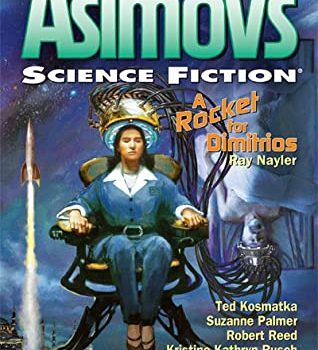Rich Horton Reviews Short Fiction from Asimov’s
 Asimov’s 1-2/21
Asimov’s 1-2/21
The January-February Asimov’s includes the longest story Ray Nayler has yet published, “A Rocket for Dimitrios“. This is another Sylvia Aldstatt story, set in an alternate history where the course of WWII was radically changed by the US discovery of an alien spacecraft and their adoption of its technology. One of the strangest pieces of alien tech allows Sylvia to experience the memories of a recently dead person – but those memories are inconsistent and constantly decaying. Sylvia and her handler are in Turkey, a US ally but not necessarily a reliable one, and she is assigned to delve into the memories of Dimitrios Makropoulus, a shady character whose dealings finally caught up with him. His latest project was trying to sell information about the supposed location of another alien ship – something the US wants kept hidden to maintain their advantages. Turkey (and other polities) would desperately like access to the tech, and they may be ready to break their relationship with the US. Sylvia herself has serious doubts about the morality of the US’s actions, set against the sure knowledge that their rivals would likely be just as bad. And then Sylvia’s encounters with Makropoulos’s memories, which give her a picture of the man’s difficult life, only complicate her feelings, and an encounter with another powerful American further tests her true loyalties. This story has its share of action and intrigue, and plenty of cool SFnal aspects, but it is most deeply an examination of morality and loyalty as it applies to nations.
Robert H. Cloake‘s “The Fear of Missing Out” nicely examines the personal effects of an interesting new technology: auto-personalities, which can take over your brain and manage an interaction with other people. You remain, but essentially as a spectator. The intended use is for things like managing a routine meeting via the “overlay” while the real you can keep doing work, but Candid, a man convinced he is unlikeable, starts to use his overlay to help him make conversation with another man he’s attracted to… and soon he has a boyfriend. But who does his boyfriend really like, Candid or Candid’s overlay? It’s a good example of a story that’s the right length to ask (and not really answer) its central question, effectively – even though I thought Candid’s nature was a bit conveniently constructed to make the story’s point. The tech itself is an SFnal idea that raises many more questions than this story can answer – which is fine.
There are two quite funny stories in this issue of Asimov’s as well. Fran Wilde‘s “Mayor for Today” takes on the gig economy. Victor has had some bad experiences with gig jobs, but he needs the money desperately, to help his daughter go to college and maybe help repair his relationship with his ex. So he takes the latest gig despite misgivings – one day as Mayor of Danzhai, China. Only a ceremonial job, it seems, and it pays well. Once he arrives, though, he learns that he’s in a line over 2,400 people long, all of whom are contractually obligated to wait until the current temporary Mayor completes his responsibilities. It seems there’s a problem with the gig company’s algorithms – a problem exploited by this particular Mayor. I won’t reveal the nature of the Mayor, but the story amusingly (albeit with a serious point) plays with the complications of the situation. “Table Etiquette for Diplomatic Personnel, in Seventeen Scenes” by Suzanne Palmer is one of a small sub-subgenre of SF stories set on space stations inhabited by multiple alien species. In this one the station commander, Ennie Niagara, confronts a diplomatic crisis: a very unpleasant species, the Joxto, hated by all other species, has left in a huff after being offended by her predecessor. Now they are returning, and Ennie needs to find a way to deal with them without letting their obnoxiousness force a terrible agreement. Soon enough she has a murder to deal with as well, not to mention an alien stowaway. I suggested the story is funny, and it is, often, in that madcap “comical alien customs collide” fashion, but it’s also a murder mystery, and the diplomatic issue that needs resolution concerns genocide… so it’s not really pure comedy. But it’s quite fun, and if the eventual solution is a just a bit contrived, it’s still worth getting there.
Finally, Naomi Kanakia‘s “I Didn’t Buy It” is a striking story about a robot and its relationship with two women, one of whom tries to damage the robot, the other of whom thinks she’s in love with him. I’m not describing it properly, and I think that’s because the effect of the story is carried by the mode of telling, which is aimed at questioning our notions about AI, and consciousness, and true feeling – and in so doing isn’t just questioning the robot’s consciousness or emotions or lack thereof – but those of humans as well. Or so I think!
Recommended Stories
“I Didn’t Buy It”, Naomi Kanakia (Asimov’s 1-2/21)
“A Rocket for Dimitrios”, Ray Nayler (Asimov’s 1-2/21)
Rich Horton works for a major aerospace company in St. Louis MO. He has published over a dozen anthologies, including the yearly series The Year’s Best Science Fiction and Fantasy from Prime Books, and he is the Reprint Editor for Lightspeed Magazine. He contributes articles and reviews on SF and SF history to numerous publications.
This review and more like it in the February 2021 issue of Locus.
 While you are here, please take a moment to support Locus with a one-time or recurring donation. We rely on reader donations to keep the magazine and site going, and would like to keep the site paywall free, but WE NEED YOUR FINANCIAL SUPPORT to continue quality coverage of the science fiction and fantasy field.
While you are here, please take a moment to support Locus with a one-time or recurring donation. We rely on reader donations to keep the magazine and site going, and would like to keep the site paywall free, but WE NEED YOUR FINANCIAL SUPPORT to continue quality coverage of the science fiction and fantasy field.
©Locus Magazine. Copyrighted material may not be republished without permission of LSFF.








